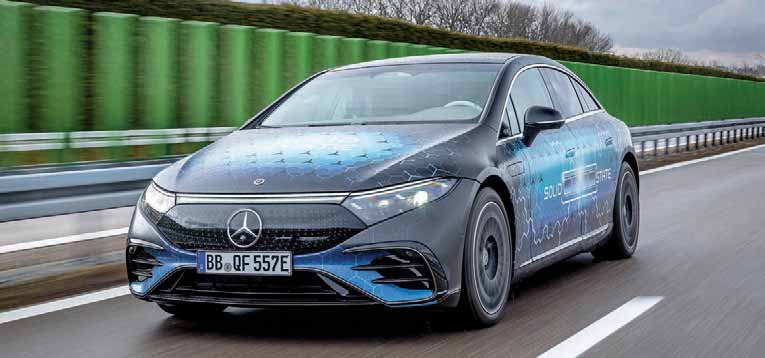

MERCEDES-BENZ PHOTOS
Mercedes-Benz will start testing solid-state batteries on the road this month, in collaboration with Factorial, a U.S. startup that is also partners with Stellantis and Hyundai-Kia.
The technology promises 25 percent more range for the same size and weight battery, Mercedes said. The EQS test car is expected to have a range of more than 1,000 km (620 miles). Currently, the maximum range for an EQS is about 800 km.
Mercedes since 2021 has invested “high double-digit millions” in Factorial, which is promoting a lithium-metal anode in its solid-state batteries.
The Massachusetts company said its Factorial Electrolyte System Technology can be integrated into existing manufacturing for conventional lithium ion batteries, potentially solving a major issue for solid-state batteries.
In general, solid-state batteries offer improved energy density, faster charging and improved safety over conventional “wet” electrolyte batteries, but they are difficult to produce at scale and no automaker has offered them for sale in a mass-produced car.
The lithium ion batteries used until now have a liquid electrolyte and a separator between the negative anode and positive cathode through which ions pass. Solid-state batteries combine the separator and electrolyte in a solid medium.
As a result, the cells can be made much thinner.
Despite their potential advantages, solid-state batteries have remained just out of reach for the auto industry. Researchers and startups are still experimenting with electrolyte materials, and problems remain with brittleness.
Patent based on ‘floating’ cell carrier
For the test cars, Mercedes-Benz and its AMG High Performance Powertrains division, based in the UK, developed and patented a new solid-state battery pack.
The patent is based on a “floating” cell carrier to accommodate changes to the battery material when charging and discharging. When the battery is charging, the materials expand, and they contract when the battery is discharging. The floating carrier includes pneumatic actuators.
Laboratory vehicle tests were conducted in Germany at the end of last year. Mercedes did not give a timeline for mass production at its capital markets day Feb. 20, where it announced the tests with Factorial, although several years ago it pointed to 2028 as a goal.
Factorial said the Mercedes test is the first time that lithium metal solid-state batteries have been integrated into a production vehicle.
Stellantis, which has invested $75 million in Factorial and has also been a partner since 2021, is slightly behind Mercedes in testing the company’s batteries.
It said in October that it would have a demonstration fleet of Dodge Charger Daytonas on the STLA Large platform on the road in 2026.
Hyundai and Kia also announced their partnership with Factorial in 2021 with an undisclosed investment.
They plan to start vehicle testing this year and are aiming for a production date of 2030.
BMW holds off
Other automakers have given varying time frames for solid-state batteries.
BMW said in February that the technology was still too expensive to commercialize and that it would focus on developing lithium ion batteries. Martin Schuster, BMW’s vice president of next-generation battery technologies, said it would be eight years before solid-state batteries became necessary, according to a report in Autocar magazine.
Renault, which several years ago announced a partnership with Airbus on solid-state batteries, is focusing on cobalt-free lithium ion batteries, although it says solid state remains a goal.
Volkswagen Group is working on solid-state batteries through a partnership with U.S. startup Quantum- Scape.
Toyota has been testing solid-state batteries in vehicles for several years, and has said it will have “limited production” of solid-state EVs in 2025.
BYD, the Chinese EV giant that makes its own battery cells, said recently that it would introduce solid-state batteries in 2027, with mass production by 2030.

